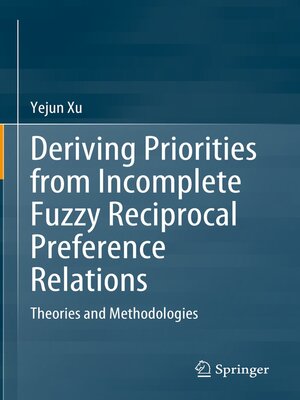Deriving Priorities from Incomplete Fuzzy Reciprocal Preference Relations
ebook ∣ Theories and Methodologies
By Yejun Xu

Sign up to save your library
With an OverDrive account, you can save your favorite libraries for at-a-glance information about availability. Find out more about OverDrive accounts.
Find this title in Libby, the library reading app by OverDrive.



Search for a digital library with this title
Title found at these libraries:
| Loading... |
As we know, multiplicative preference relations (or called pairwise comparisons in AHP) were proposed by Dr. Thomas L Saaty. One important work is to derive its priority from pairwise comparisons. It has been proposed many methods to derive priority for multiplicative preference relation. On the basis of fuzzy sets, the fuzzy reciprocal preference relation is proposed and is extended to the incomplete contexts. However, how to derive the priorities from incomplete fuzzy reciprocal preference relations is an interesting and challenging work. This book systematically presents the theories and methodologies for deriving priorities from incomplete fuzzy reciprocal preference relations. This book can be divided into three parts. In the first part, this book introduces the basic concepts of fuzzy reciprocal preference relations and incomplete fuzzy reciprocal preference relations. Then, two consistencies of complete fuzzy reciprocal preference relations are introduced: additive consistency and multiplicative consistency. Then, the relationships between the fuzzy reciprocal elements and the weights are showed. Afterward, in the second part, different priority methods are presented. The inconsistency repairing procedures are also proposed. Last, the priority method for incomplete hesitant fuzzy reciprocal preference relations is presented. This book can be used as a reference for researchers in the areas of management science, information science, systems engineering, operations research, and other relevant fields. It can also be employed as a textbook for upper-level undergraduate students and graduate students.






